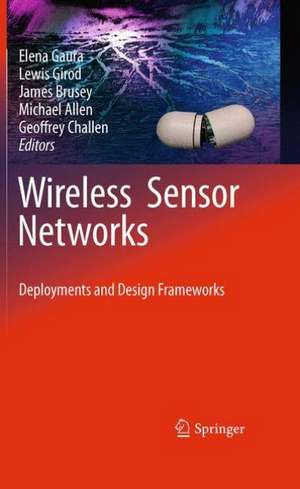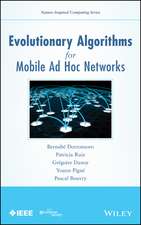Wireless Sensor Networks: Deployments and Design Frameworks
Editat de Elena Gaura, Lewis Girod, James Brusey, Michael Allen, Geoffrey Challenen Limba Engleză Hardback – 22 sep 2010
| Toate formatele și edițiile | Preț | Express |
|---|---|---|
| Paperback (1) | 945.14 lei 6-8 săpt. | |
| Springer Us – 20 noi 2014 | 945.14 lei 6-8 săpt. | |
| Hardback (1) | 951.14 lei 6-8 săpt. | |
| Springer Us – 22 sep 2010 | 951.14 lei 6-8 săpt. |
Preț: 951.14 lei
Preț vechi: 1159.94 lei
-18% Nou
Puncte Express: 1427
Preț estimativ în valută:
182.02€ • 197.65$ • 152.90£
182.02€ • 197.65$ • 152.90£
Carte tipărită la comandă
Livrare economică 23 aprilie-07 mai
Preluare comenzi: 021 569.72.76
Specificații
ISBN-13: 9781441958334
ISBN-10: 1441958339
Pagini: 300
Ilustrații: XVI, 290 p.
Dimensiuni: 155 x 235 x 28 mm
Greutate: 0.61 kg
Ediția:2010
Editura: Springer Us
Colecția Springer
Locul publicării:New York, NY, United States
ISBN-10: 1441958339
Pagini: 300
Ilustrații: XVI, 290 p.
Dimensiuni: 155 x 235 x 28 mm
Greutate: 0.61 kg
Ediția:2010
Editura: Springer Us
Colecția Springer
Locul publicării:New York, NY, United States
Public țintă
Professional/practitionerDescriere
The twentieth century ended with the vision of smart dust: a network of wirelessly connected devices whose size would match that of a dust particle, each one a se- containedpackageequippedwithsensing,computation,communication,andpower. Smart dust held the promise to bridge the physical and digital worlds in the most unobtrusive manner, blending together realms that were previously considered well separated. Applications involved scattering hundreds, or even thousands, of smart dust devices to monitor various environmental quantities in scenarios ranging from habitat monitoring to disaster management. The devices were envisioned to se- organize to accomplish their task in the most ef?cient way. As such, smart dust would become a powerful tool, assisting the daily activities of scientists and en- neers in a wide range of disparate disciplines. Wireless sensor networks (WSNs), as we know them today, are the most no- worthy attempt at implementing the smart dust vision. In the last decade, this ?eld has seen a fast-growing investment from both academia and industry. Signi?cant ?nancial resources and manpower have gone into making the smart dust vision a reality through WSNs. Yet, we still cannot claim complete success. At present, only specialist computerscientists or computerengineershave the necessary background to walk the road from conception to a ?nal, deployed, and running WSN system.
Cuprins
Wireless Sensor Networks Design for Deployment.- Learning from Deployment Experience.- Designing for Deployment.- Wireless Sensor Network Applications Case Studies.- Volcano Monitoring: Addressing Data Quality Through Iterative Deployment.- VoxNet: Reducing Latency in High Data Rate Applications.- Failure Is Inevitable: The Trade-off Between Missing Data and Maintenance.- Cane Toad Monitoring: Data Reduction in a High Rate Application.- ExScal: Dealing with Scale.- Glacier Monitoring: Deploying Custom Hardware in Harsh Environments.- Adding the Human Element: Experience with a Wireless Patient Monitoring System.
Textul de pe ultima copertă
Wireless Sensor Networks: Deployments and Design Frameworks takes a practical, experience driven view of wireless embedded networked sensing systems, providing a comprehensive discussion of design and deployment problems and guidance for future development. The book: -Reviews the state of the art with respect to practical WSNs and their adoption -Presents seven notable real-life WSN design/deployment case studies -Provides informed, systematic support towards new application design and implementation -Synthesizes strategies for design and deployment suitable for both academia and industry -Highlights key issues and trade-offs in the WSN design space Wireless Sensor Networks: Deployments and Design Frameworks will help the practitioner approach the design of WSN-oriented application systems from an informed standpoint. To be successful in development and deployment of WSNs, it is important to build upon the past achievements and experiences of others, and to follow examples of good design; this book enables both.
Caracteristici
Brings together successful Wireless Sensor Networks deployments within a generic design/development framework Provides a design framework for rapid development of Wireless Network Systems that is easy to understand and apply Provides practical hints and guides to available technology choices in a structured manner Provides formal routes to rapid design and deployment and evaluation of Wireless Sensor Network applications











